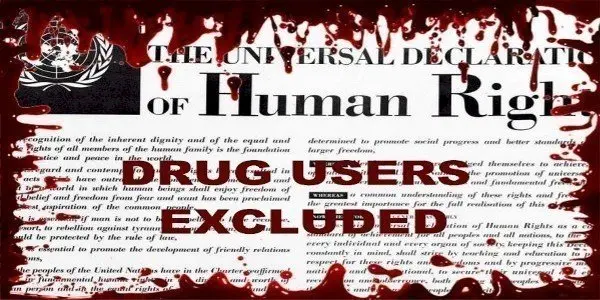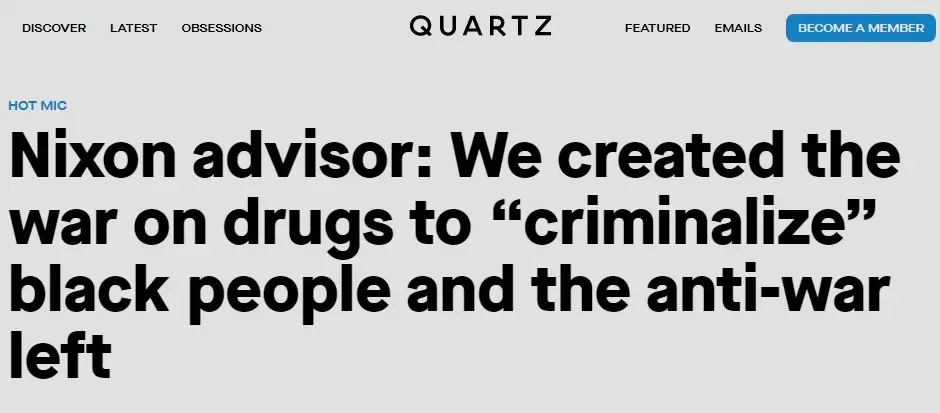Activism, The Charter of Drug Users Rights #
Drug users across the world are prosecuted, persecuted and marginalized. However, in recent years there have been indications of a grassroots counterresponse to this oppression, albeit one which is still barely perceptible.
One initiative is The Charter Of Drug Users Rights, for which I agreed to write the script. Although this has not taken off, it is worth reproducing here, hopefully as a sign of things to come.
The petition itself can be found via the following URL:
https://www.change.org/p/the-united-nations-secretary-general-the-charter-of-drug-users-rights
The Charter of Drug Users Rights #

According to the UN there are a quarter of a BILLION drug users globally, which is more than the entire populations of the UK, France and Germany combined. This is a significant minority of the world’s population.
There are a myriad of reasons why these individuals take drugs, but usually they make a proactive decision to do so. In other words, they adopt a primordial right to choose what to put into their OWN bodies, and they choose how to change their OWN consciousness.
Unfortunately, these innate personal freedoms are largely denied and proscribed by states and governments. Non-violent citizens are arrested, criminalized and imprisoned, for no other reason than that they have exercised this fundamental human right with respect to THEMSELVES.
This (often violent) oppression is augmented and sustained via media coverage which ignores and marginalizes the victims’ interests and perspectives. Mainstream output invariably aligns with a destructive war on drugs narrative, and excludes direct and factual information/news which would save lives. The aggressive flow of ideologically based propaganda is unrelenting, whilst even the most basic harm-reduction initiatives, remain totally unreported and largely unknown.
This unremitting flood of unbalanced journalism manifestly serves to re-enforce the stigma and hostility endured by what has become a socially persecuted minority. Drug users have no voice, no statutory protection, and nowhere to turn.
With their civil and human rights being routinely and systematically violated across the world the picture could hardly be bleaker. It is a level of abuse and degradation which for any other minority would be widely recognised and condemned. Even the term itself, drug user, has been so misappropriated that it has become pejorative, placing anyone thus referenced outside the orbit of normal moral consideration.
It is within this desperate and harrowing context that the following demands are presented:
-
The immediate cessation of the war on drugs.
-
Drug dependency and addiction to be treated as health issues rather than criminal matters.
-
The release of all imprisoned non-violent drug offenders, and allconvictions for non-violent drug offences to be expunged.
-
Recognition of the right to use drugs recreationally, inclusive of social parity with alcohol users, and a cessation of cultural and other forms of discrimination.
-
Urgent repeal and reform of global drug treaties to expedite the above, with new drug related legislation framed to recognise the supremacy of the Universal Declaration of Human Rights and its application to all.
RELATED INFORMATION & SAFETY RESOURCES #
HUMAN RIGHTS, POLITICAL IMPRISONMENT & STATE TERRORISM #
To hold sovereign and exclusive ownership of one’s own conscious mind, to explore freely and without boundary, is surely the most fundamental of human rights. Or, reflecting this in the first person: to determine what I put into my own body, causing no harm to anybody else, is my own affair and not that of a third party or state.
These rights are indirectly enshrined within both the UN’s Universal Declaration of Human Rights and the Bill of Rights to the US Constitution, but regardless, they are held as canon by the rational and reasonable across our planet.
It clearly follows that to forbid the use of psychoactive materials, which are often naturally occurring botanicals, is a gross and direct infringement of these inalienable freedoms. Ipso facto prohibition is self-evidently a wilful exercise of external control over the individual’s mind and body; an undeniable constraint on personal liberty.
Equally, the categorical and unambiguous breach of these rights is an unequivocal political act in statute, decree and enforcement. By definition this renders anyone imprisoned for contravention of this mandate to be a person imprisoned for their political beliefs or actions, which is the textbook definition of a political prisoner.

In this context the war on drugs constitutes a brutal and unremitting exercise of state sponsored persecution and oppression. It can reasonably be regarded as organised terrorism on a global scale, targeting those who choose to exercise the politically proscribed human right of perturbing their own consciousness. It is a war of terror, explicitly terrorising users of drugs and their families.
Death, addiction, mass incarceration, and appalling social wreckage are inevitable consequences when the machinery and propaganda of state are ruthlessly and mercilessly turned upon innocent citizens in this manner. Historians will surely view this as an age of barbaric ignorance and cruelty, and will castigate the perpetrators accordingly.